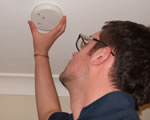 Go to main content
Go to main content
Archive Website of the UK government
Please note that this website has a UK government accesskeys system.
Main menu
Page menu
Home and community

Health and safety in privately rented accommodation

If you are a residential landlord your rented properties must meet health and safety standards designed to protect your tenants. Find out about regulations for gas and electrical safety, fire regulations and energy performance certificates.
Landlord and tenant responsibilities for health and safety
As a landlord, you must keep your rented properties safe and free from health hazards. You must make sure that all gas and electrical equipment in your properties has been safely installed and is maintained. You must also follow fire safety regulations - for example, by checking that tenants have access to escape routes at all times.
Under the Housing Health and Safety Rating System (HHSRS), your local authority may inspect your property for health and safety hazards. If it finds serious problems, you will have to fix them. However, you can reduce the chance of this by carrying out your own checks for potential hazards, like damp. If you are a person licensed by a local authority to let out a property - a 'licensor' - you do not have the same health and safety responsibilities as landlords. However, you are still covered by the HHSRS. These standards are usually checked by your local authority's environmental health team.
Your tenants have a duty to use the property in a responsible way - for example, by clearing kitchen sinks clogged of food waste to avoid blockages. They are also responsible for any damage caused by their family or friends.
Tenants should only carry out repairs to a property if they have agreed this with their landlord in their tenancy agreement.
Gas and electrical installation and appliance safety
As a landlord, you are responsible for making sure that any gas and electrical installations in your rented properties are safe.
Gas installation safety
If you let a property connected to a mains gas supply, you must arrange an annual maintenance check of gas pipe work, appliances and flues. This should be carried out by an engineer registered with the Gas Safe Register - formerly Corgi.
You should keep inspection records for at least two years and give copies of the reports to your existing tenants within 28 days of each check. You should also give copies to new tenants before they move in.
Your tenants are responsible for any gas appliances they own, but you must still maintain the parts of any associated gas installations - like flues and ventilation grilles - and the pipe work.
Electrical installation safety
At the beginning of each new tenancy, you should ensure that electrical installations - like fixed wiring - are safe and well maintained. Any electrical appliances you supply to tenants - like cookers and kettles - should be safe for them to use.
You should carry out regular inspections of fixed electrical installations - like sockets and light fittings - every five years. You should also arrange, at least once a year, for a qualified electrician to carry out a portable appliance testing (PAT) safety test on any portable electrical equipment you provide for tenants, like kettles. The PAT tester will give you a dated certificate and put stickers on the plugs of appliances to show that they are safe.
Fire safety standards
You must make sure your tenants have an escape route from your properties in case of fire. Depending on the size of the property, you may also have to provide fire alarms and extinguishers.
If you have a property let out to several different tenants - a house in multiple occupation - you may be asked to carry out a fire risk assessment by your local housing authority or fire service.
The assessment is designed to:
- identify fire hazards
- reduce the risk of hazards that may harm occupants
- decide what physical fire precaution measures, like fire doors, and management procedures may be needed - if any risks are found, you may be asked to make changes, like clearing fire escapes
You must follow the fire-resistant furniture regulations if you let furnished accommodation to tenants. Furniture manufacturers will usually label their fire-resistant products. If a property is let on a one-off, short-term basis - for example, while you work away from home - the regulations do not apply.
Energy performance certificates and landlords
If you rent out, buy, sell or build a property, you will need to get an Energy Performance Certificate (EPC). An EPC rates the energy efficiency of a property. It is based on the building's energy performance - for example, how much heat is lost through the roof.
An EPC also takes account of the property's heating and lighting. EPCs do not cover domestic appliance performance, like washing machines.
An EPC is valid for ten years - even if new tenants move into your property during that time. You should give a copy of your property's current EPC to each new tenant.
 Facebook
Facebook Twitter
Twitter StumbleUpon
StumbleUpon Delicious
Delicious Reddit
Reddit